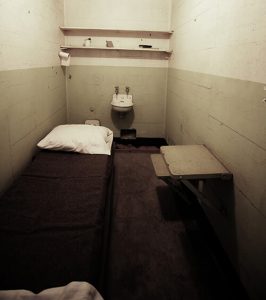Will There Be a Change in Solitary Confinement Laws in NJ?
Posted April 15th, 2016 by Anthony Carbone, PC.
Categories: Criminal Defense, Legal Topics.
 Solitary confinement has a practice used in prisons throughout the world for centuries. What it means is a prisoner is isolated from the rest of the prison, with the exception of correctional officers. It is used as a form a punishment or for protection purposes. Prisoners have compared solitary confinement to being buried alive: “It’s like being in a coffin,” said one prisoner who did two years in solitary confinement.
Solitary confinement has a practice used in prisons throughout the world for centuries. What it means is a prisoner is isolated from the rest of the prison, with the exception of correctional officers. It is used as a form a punishment or for protection purposes. Prisoners have compared solitary confinement to being buried alive: “It’s like being in a coffin,” said one prisoner who did two years in solitary confinement.
Recently, a new bill was introduced in New York that would change solitary confinement in the state. Called the Human Alternatives to Long-Term Solitary Confinement Act (HALT), it creates an alternative to isolated confinement as well as ends long-term confinement. Where prisoners can be separated from prison population for years, even decades, HALT now specifies that prisoners can only be held in isolated confinement for no more than 20 days in any 60-day period. Once the limit has been reached, the prisoner will then be sent to a rehabilitation unit where he/she will receive therapy and therapeutic programs to help the prisoner get over the ordeal.
Is this a policy that New Jersey needs? Unfortunately, our state is one of those that puts prisoners into solitary confinement for long periods of time. The maximum sanction is one year per violation; however, sentences can run consecutively which can add up. According to the website Solitary Watch, there were 1,537 people held in some type of restrictive setting as of January 2015. This means that 7 percent of New Jersey prisoners are in isolation, which is above the national average.
But changes may be coming. Earlier this year, Governor Chris Christie had signed into law that limits uses of solitary confinement for juveniles. But what about adult prisoners? Sadly, there’s no bills on the books and prisoners are still suffering in isolation.
If you were arrested and are in need of a criminal defense attorney in New Jersey, we can help. Contact the Law Offices of Anthony Carbone now for a free consultation.


